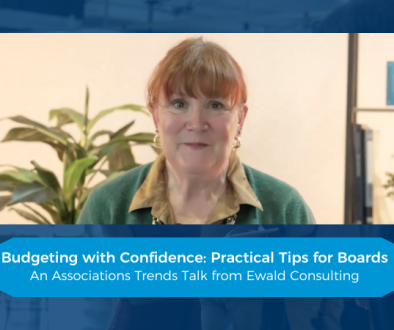Facing Fear: Four Mistakes To Avoid as an Association Leader
Most people in leadership positions have some fear of failure. This is especially true for board associations. After all, they are responsible for advancing the association and profession as a whole for its stakeholders. Association board members have a sense of accountability for the outcomes, whether they’re successful or not.
Fear of failure can prevent a board member or even the full board from making decisions in their organization’s best interest. It can also lead to making decisions that are not in line with the association’s values or strategic goals.
The truth is that worries are common among many board members, whether they’ve been on boards for years or are relatively new to the role. You are certainly no exception to this. Here are a few common fears that have been shared by board members who have gone through interesting journeys of their own.
1. Feeling unprepared or unqualified for the role
It’s quite normal for you to encounter some form of self-doubt in your tenure. You may feel that you are not fully equipped to deal with all the responsibilities required of your service. Certainly, this can be aggravated further when you are faced with problems that you’ve never encountered in the past, such as financial oversight, representing the profession and organization in industry forums, or cultivating partnerships with some of the leading players in the market. However, it is important for you to remember that everyone has their own unique set of experiences and qualifications that they can bring to the table.
There is absolutely no shame in admitting when something isn’t your specialty. You can always seek the wisdom of more experienced individuals who have expertise on the matter.
2. Not having enough information to make good decisions
This is a common fear for first-time board members. After all, you are used to making decisions based on your personal knowledge and expertise. Now, you are tasked with making collective decisions that will affect the entire organization.
Of course, it can be difficult to make informed decisions when you are not familiar with all the relevant information. However, this is where seeking the input of veteran board members, board officers, and your chief staff executive comes in handy. Brainstorming with fellow leaders can help you understand the key areas of focus and surface different perspectives that you may have missed.
3. Being too busy to commit to the role
Board members often have full-time jobs and/or other commitments outside of their board service. This can make it difficult to find the time required to fulfill all the duties of the position.
4. Having a conflict of interest
Board members are often reluctant to voice their opinions on certain matters for fear of appearing biased. This is especially true if they have a personal stake in the issue at hand. However, it is important to remember that you were chosen for your position because the organization values your expertise and opinion. Therefore, you should not hesitate to share your thoughts on the matter, even if it means going against the grain.
Of course, there will be times when it is important to avoid even the appearance of a conflict of interest. In these cases, it is best to recuse yourself from the discussion and allow the other board members to come to a decision.
You can do it
These are just a few of the fears that you may face as a new board member. Remember, everyone faces their own challenges, and there is no shame in admitting when you need help. By working together with your fellow directors, you can overcome any obstacle that comes your way.




